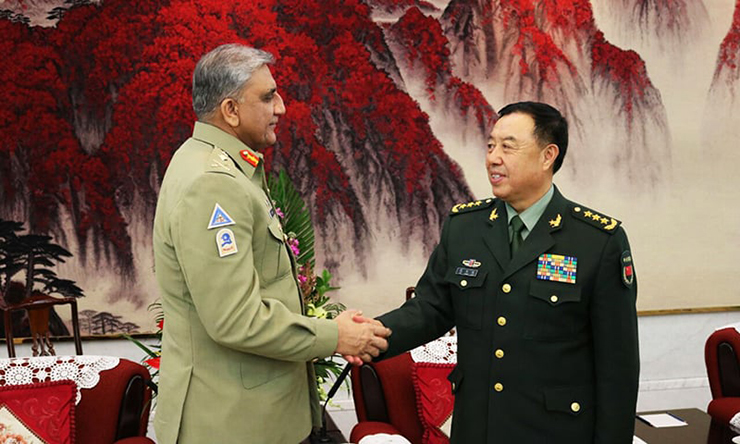
The US Department of Defence has released a report titled “China Military Power 2022”, showing how Pakistan and China are all-weather strategic partners. China depends on Pakistan to achieve long-term goals like “national rejuvenation”. Pakistan is trying to tread a delicate balance between the US and China; however, no US deal can pull Pakistan away from China. As China and the US engage in a greater polarisation of bilateral engagements, countries like Pakistan are battlegrounds for proxy wars. However, it is time for the US to cut its losses.
How China Traps Pakistan
For China, Pakistan is the only all-weather strategic ally; even Russia is a comprehensive strategic partner with coordination relations. In the last five years, China has expanded its ties with its historical partners, Pakistan and Russia. Pakistan is also one of the preferred locations for China’s military logistics facilities.
China’s entrapment of Pakistan has been with the help of its Belt and Road Initiative (BRI), under which many pipelines and port construction projects are active in Pakistan. For China, these projects help it become less reliant on transporting energy resources through strategic choke points, such as the Strait of Malacca. Beijing also attempts to exploit the relationships it builds through BRI to pursue further economic cooperation with participating countries.
In 2021, ten Chinese nationals were killed and twenty-six others injured when a suicide bomber targeted a workers’ bus to a BRI infrastructure development project in Pakistan. This incident armed China enough to justify the presence of its military on Pakistan’s “sovereign” land. It was yet another example of how China extended its ability to project military power overseas under the garb of safeguarding its investments like the BRI or counterterrorism cooperation with Pakistan.
Further, China persuades the BRI host nations to accept Chinese military aid, including military equipment, as a donation. In lieu of this policy, Pakistan’s remote sensing satellite was launched by China. Examples of China-Pakistan cooperation include joint military exercises. In 2020-21, China participated in a joint naval exercise with Pakistan and also supplied strike-capable Caihong and Wing Loong Unmanned Aircraft Systems to Pakistan. China also provided major naval vessels to its partners, highlighted by Pakistan’s 2015 purchase of eight Yuan class submarines for more than $3 billion.
Punish Not Sponsor: US Must Cut Losses in Pakistan
Pakistan remains a state sponsor of terrorism. During the 26/11 attacks in Mumbai, Pakistan-based and trained terrorists gunned down many from countries like the US. Further, military operations like Operation Tupac are responsible for decades of violence in Kashmir. Even now, Pakistan’s ISI continues to fund Khalistan terror networks in Punjab, the US, Canada and UK. Pakistani officials with American blood on their hands roam free.
Americans, acutely aware of the Pakistani role in bloodshed, continue to award it military aid like F-16 upgrade kits. The very Pakistani officials that targeted and killed Americans are received with honours.
For Americans, their Pakistani partners treat them as inferior to China. Pakistan has repeatedly provided China access to American military technologies like the stealth helicopter that the US Navy Seals used in their operation against Osama Bin Laden. Pakistan lacks an ounce of sovereignty. Such bilateral cooperation between Pakistan and China has rendered Pakistan to be merely a vassal of China.
All of this raises the obvious question: why does the United States continue to consider Pakistan a major non-NATO ally, let alone provide it with advanced weaponry? First, the United States might want to reward Pakistan for providing intelligence on wanted terrorists. Unfortunately, Pakistan’s balance sheet shows that the country does US security far more harm than good.
Secondly, with three large consulates and an embassy, many diplomats are cycling through Pakistan. Some internalise and promote the grievance-based narrative that Pakistanis sell themselves about the US disrespect and victimhood in the war against terror. This Pakistan lobby within the US State Department may genuinely believe that Washington owes Islamabad more. This lobby argues for equitable treatment of Pakistan and India by the US. An emphasis on equity, however, ignores that India is the world’s largest democracy and a strategic partner, while Pakistan is a failing state and a strategic liability.
A third argument centres on great power competition. Many in the US policy community rightly see China as a significant regional threat. Maybe, providing Pakistan weaponry can help American officials build personal relationships with key Pakistani military officers, especially those like Pakistani Army Chief of Staff Qamar Javed Bajwa, who studied in the US. As these officials near retirement from military service, sale of weaponry can aid Americans in building new personal rapport with replacements.
More importantly, selling F-16 upgrades and other high-technology weaponry can drive a wedge between China and Pakistan and slow, if not reverse, Sino-Pakistani ties. Today, China’s debt diplomacy prevents Pakistan from pivoting away from China, even if its larger military establishment willed so. Giving Pakistan such technology simply offers Pakistan additional collateral to pay the Chinese Communists.
For Americans, not only has Pakistan been a bad bet but also a strategic blunder. The logic employed by the support of Pakistan’s major non-NATO ally status, along with other military aids, fails to justify the blood of their fellows at the hands of the same Pakistanis they support. They substitute wishful thinking for reality and rub salt into the wounds of those killed in Mumbai and Afghanistan by Pakistani-trained terrorists.
The United States should never give military equipment on the promise of change — only on evolution itself. Until Pakistan arrests those responsible for the Mumbai attacks, disband the ISI, and purges those in the military who support the Taliban, Al Qaeda, and other radical terrorist groups, for the US, Pakistan is deserving of not handouts but slaps on the wrists.
– The writer is an Aerospace and Defence Analyst & Director ADD Engineering Components (India) Pvt Ltd (An Indo- German Company). The views expressed are of the author and do not necessarily reflect the views of Raksha Anirveda








